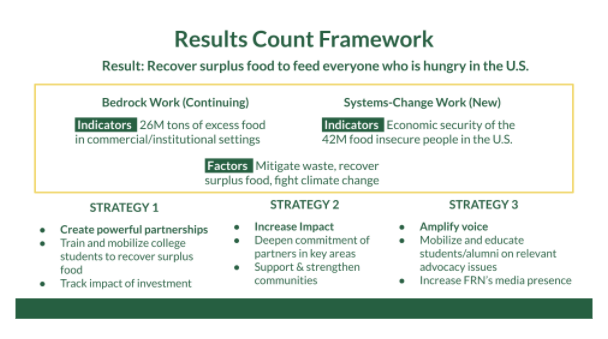Food Recovery Network's solutions to feeding those in need includes food recovery AND systems change
As part of our systems change work, Food Recovery Network advocates for policies that will support the economic security of the 42 million people who are currently food insecure. We also understand that the underlying causes that enforce such vast economic disparities affect our student leaders, who lead the charge to recover food in their communities and support their neighbors. FRN’s strategic framework guides our method for FRN to contribute our unique offerings to fight for the intertwined economic and food security of these 42 million people.
Two years ago, we publicly announced our strategic framework, FRN10X, to help us achieve our goal to recover surplus food to feed everyone who is hungry in the US. Within this framework, FRN continues the foundational work our student leaders, alumni, and dedicated stakeholders have done since our founding in 2011: recovering surplus precious food and donating it to those who are food insecure and hungry. This is our bedrock work and reflects our deep commitment to ensuring that all people, including current higher education students, have access to the food that they deserve. We know that we’re successful in accomplishing our bedrock work when we’re contributing to the reduction of the 26 million tons of surplus food produced annually in the commercial and institutional sectors - think food from farm fields, grocery stores, corporate dining halls, and higher education dining halls.
While we continue our bedrock work, through our newly focused systems change work FRN is working to reduce the number of people in the US who are food insecure to zero. We’ll know that we’re successfully contributing to this work when the 42 million people who are currently food insecure achieve economic security. When people are economically secure, they can obtain the basic necessities to live like food, shelter, healthcare, and education. To reduce the number of people who are food insecure, FRN engages in strategies outside of recovering surplus food. We’re focusing on these efforts because we know that access to food, while a basic human right that we continue to fight for, does not necessarily support a person’s overall economic security.
FRN is engaging in systems change work because of the potential to directly impact our student leaders and alumni today and in the future. Our systems change work involves interrogating our existing systems for elements rooted in racism, inequality, sexism and other structures that build into the system the very disparities we are constantly trying to solve for at FRN. I have said it a thousand times: 42 million people are not food insecure because they have simply consistently made bad decisions with their money or their lives. The myth that people are struggling or are poor because of their own moral failing or unwillingness to work hard has been told for as long as the US has existed and it is so old, many of us don’t even consider the myth’s origins. Many of us also believe that myth, especially when we believe we have seen examples that justify it.
Forty-two million people are food insecure because their wages have been suppressed, because many of us carry medical debt due to lack of adequate and affordable health insurance, because of lack of access to actual healthcare, and because for many, the leap to advancement to obtain better paying jobs through higher education has saddled us with crippling student debt. And we see time and again that people of color are disproportionately affected by these factors.
Two areas of our systems change work that are part of the path to fighting for economic security, and that specifically affect our student leaders, are an increased minimum wage and the examination of affordable higher education. When students graduate, they can carry student debt that stays with them and their families for generations. While pursuing their degrees, students also work hourly wage jobs, and after graduating often take jobs that pay by the hour. The current federal minimum wage is low enough that it contributes significantly to the economic insecurity of our students.
As we dive deeper into our systems change work, we will continue to have conversations about our work and approach and invite you all to be in conversation with us. We’ll also continue to highlight our powerful partners who are working to ensure the economic security of those who are food insecure and will put forward actionable steps for all of us to take to redesign a system that supports all of us.
Resources to learn more about our systems change work
Read my recent blog post where I talk more about FRN’s commitment to the fight for $15 campaign. FRN is committed to supporting an increase in the federal minimum wage because our students work in jobs that pay hourly rates and will graduate and enter into a workforce that also offers a suppressed hourly rate. The current minimum wage is a system that prevents so many from achieving economic and food security.
The image below is our Results Count Framework, FRN10X. To learn more about this framework and how we use it, go to Roundtable Talks to watch any of the public conversations we’ve had about FRN10X. If you have questions about the framework, please be in touch directly with us, and look out for our next Roundtable Talk in late summer 2022.




